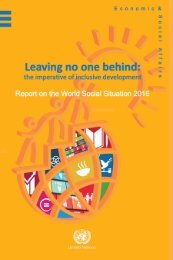The Travel & Tourism Competitiveness Report 2013
The Travel & Tourism Competitiveness Report 2013
The Travel & Tourism Competitiveness Report 2013
Create successful ePaper yourself
Turn your PDF publications into a flip-book with our unique Google optimized e-Paper software.
1.1: <strong>The</strong> <strong>Travel</strong> & <strong>Tourism</strong> <strong>Competitiveness</strong> Index <strong>2013</strong><br />
Box 2: <strong>The</strong> A to Z of aviation and T&T trends, <strong>2013</strong><br />
<strong>The</strong> World Economic Forum’s Aviation & <strong>Travel</strong> Community has identified a number of critical trends for the industry: 1<br />
ALLIANCES <strong>The</strong> year 2012 has seen its share of alliances,<br />
mergers, acquisitions, and strategic investment activities.<br />
Notwithstanding the legal and regulatory hurdles, a number<br />
of carriers now see a benefit in strategic investments: Etihad<br />
has a 29 percent stake in Air Berlin, Air Asia has a 20 percent<br />
stake in Malaysian Airlines, Qatar has a 35 percent stake<br />
in Cargolux, and Delta has recently acquired 49 percent of<br />
Virgin Atlantic. With the US Airways–American Airlines merger<br />
creating the world largest airline and mid-tier airlines seeking<br />
investment in Europe, this trend should continue in <strong>2013</strong>. <strong>The</strong><br />
same trend is seen in the online travel services industry, with<br />
the latest acquisition of Kayak by Priceline.<br />
BARRIERS Structural barriers such as market access,<br />
trade, and environmental constraints have been the biggest<br />
impediments to the sustained growth of transport and the<br />
travel sector. Reform will be necessary to avoid a rise of<br />
protectionism that hampers industry growth.<br />
COMPETITIVENESS According to the World <strong>Travel</strong> & <strong>Tourism</strong><br />
Council, the <strong>Travel</strong> & <strong>Tourism</strong> (T&T) sector currently accounts<br />
for 9 percent of GDP—a total of US$6 trillion. It generates<br />
120 million direct jobs and another 125 million indirect jobs—<br />
that comes to one in eleven jobs on the planet. 2 With <strong>Travel</strong> &<br />
<strong>Tourism</strong> being a key sector for many emerging and developed<br />
economies, understanding at a political level how to eliminate<br />
its structural barriers is essential. <strong>Competitiveness</strong> in the<br />
global manufacturing sector is a crucial issue for aerospace<br />
manufacturers because of the increased complexity of issues<br />
arising from managing global value chains.<br />
DATA Advances with analytics are identifying “best<br />
customers,” building loyalty, and improving operations using<br />
customer reviews and social media as a management<br />
tool. Big Data is also affecting the travel industry in areas<br />
that range from online bookings to the traveler’s service<br />
experience in the hotel.<br />
EMISSIONS <strong>The</strong> inclusion of international aviation emissions<br />
in the European Union’s Emission Trading System, which<br />
caused political backslash in many countries, has been<br />
suspended on the premise that a global framework to<br />
regulate aviation emissions will be agreed on at the next<br />
International Civil Aviation Organization (ICAO) General<br />
Assembly in <strong>2013</strong>. Will the ICAO General Assembly be able to<br />
deliver a global framework?<br />
FUEL <strong>The</strong> erratic and now impossibly difficult task<br />
of predicting fuel price changes is leading the aviation<br />
industry to either look at new business models (e.g., Delta’s<br />
acquisition of the Phillips 66 refinery in Pennsylvania) to offset<br />
possible hikes, or search for a way to kick-start commercial<br />
production of alternative fuels plants for flight. Will <strong>2013</strong> see<br />
a breakthrough in the commercial production of alternative<br />
fuels for aviation?<br />
GDS Global distribution systems are coming under more<br />
pressure to innovate, and the International Air Transport<br />
Association (IATA) is calling for a standard for a new<br />
distribution capability. Multimillion dollar airline product<br />
investments cannot break free of product descriptions limited<br />
to booking classes such as first class, business class, and<br />
economy class and their derivatives. Personalized offers<br />
based on availability, customer needs, preferences, or<br />
histories are effectively impractical in the current structure.<br />
6 | <strong>The</strong> <strong>Travel</strong> & <strong>Tourism</strong> <strong>Competitiveness</strong> <strong>Report</strong> <strong>2013</strong><br />
HEADWINDS An anemic global economy and a weak growth<br />
forecast have been the headlines of 2012. It was a terrible<br />
year for the euro zone, and the region’s instability caused<br />
great concern for European carriers as well as Europe’s<br />
travel and hospitality industry. <strong>The</strong> looming United States’<br />
“fiscal cliff” provided no respite either. <strong>The</strong> outlook for growth<br />
in Europe and the United States in <strong>2013</strong> remains uncertain<br />
and low at best. This gloomy point of view will definitely have<br />
repercussions on the transport, travel, and hospitality sectors.<br />
INTEGRATION Passengers are demanding a seamless travel<br />
experience. Given the technological advances in the different<br />
transportation modes, intermodal integration is perceived<br />
as a solution to the many transport problems facing modern<br />
societies (e.g., rising levels of accidents and emissions and<br />
noise from transport), and it plays an important role by<br />
enabling better mobility for the traveler. Integration can also<br />
help carriers rethink how they can maximize the effectiveness<br />
of their networks. Intermodal integration is already on<br />
European policymakers’ agendas, and new business models<br />
tackling this need are emerging.<br />
JOBS According to Oxford Economics, workers who begin<br />
their careers in the travel industry have greater access to<br />
educational opportunities, enjoy better career progression,<br />
and achieve higher wages. Moreover, at a time of high<br />
unemployment, especially among youth, the aviation and<br />
travel industries remain a resilient vector of growth in many<br />
countries that have growing employment figures despite the<br />
economic crisis. WTTC is expecting that, by 2022, the T&T<br />
industry it will account for 328 million jobs, or one in every<br />
eleven jobs on the planet. 3<br />
KYOTO <strong>The</strong> Kyoto Protocol was set to expire in 2012. At<br />
the same time, international climate diplomacy remains fairly<br />
intractable, although discussions are continuing under the<br />
UN Framework. <strong>The</strong> outcomes of the meetings in Doha in<br />
December 2012 had a fairly limited impact on environmental<br />
regulations and action plans intended to reduce the sector’s<br />
emissions at both domestic and international levels.<br />
LEISURE Inbound and domestic leisure travel spending<br />
generated 76.0 percent of direct T&T GDP in 2011<br />
(US$3,056.9 billion), compared with 24.1 percent for business<br />
travel spending (US$968.4 billion). With the new middle class<br />
in emerging countries, leisure travel will continue to outgrow<br />
business travel, which is already maturing in many emerging<br />
countries.<br />
MOBILE From online to mobile, new communication<br />
platforms are being used for searching, choosing, and—to<br />
a certain degree—booking travel and accommodations in<br />
most countries for medium-cost travel. However, will online<br />
become the method-of-choice for booking high-end travel<br />
where human interface and concierge-like services are still<br />
important, and for emerging markets where travel agents still<br />
play an important role? Social local mobile applications have<br />
become more prevalent in 2012, with companies such as<br />
rome2rio and Airbnb. Will these new companies significantly<br />
change the business models of travel and stay?<br />
NEXTGEN <strong>The</strong> budget, delay, and governance issues<br />
in implementing next-generation air traffic management<br />
systems, such as NextGen in the United States and the<br />
Single European Sky in Europe, will continue to occupy the<br />
attention of the industry in <strong>2013</strong>.<br />
© <strong>2013</strong> World Economic Forum

















